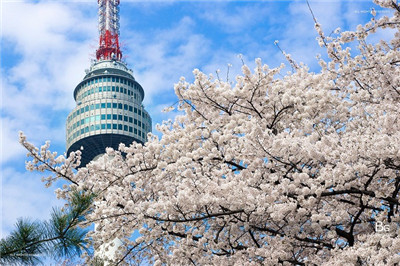(单词翻译:单击)
China’s masses of globetrotting tourists are changing their habits amid currency shifts, evolving fashions and upheavals in everything from politics to visa policies — with Japan, South Korea and Russia among the biggest beneficiaries.
随着汇率变动、风尚演变,以及从政治到签证政策等事情的变迁,中国的海外观光大军正在改变出行习惯——日本、韩国和俄罗斯成为最大受益者。
Despite historical enmity and persistent political tensions between Beijing and Tokyo, the number of mainland Chinese tourists visiting Japan jumped to 359,000 last month, a year-on-year rise of almost 160 per cent, according to the Japan National Tourism Organisation.
尽管存在历史的仇恨以及两国政府间持续的政治紧张,但根据日本国家旅游局(Japan National Tourism Organisation)的数据,上月赴日旅游的中国大陆游客数量跃升至35.9万人,同比上升近160%。

Mainlanders’ visits to South Korea also soared, up 58 per cent to 516,787 last month against the year before, according to the Korea Tourism Organisation.
赴韩国旅游人数也同样飙涨,根据韩国旅游发展局(Korea Tourism Organisation)的数据,上月赴韩旅游的中国游客人数达到516787人,同比增长58%。
Meanwhile, China overtook Germany in 2014 as the biggest source of foreign tourism to Russia with almost 410,000 visits, according to Rostourism.
同时,俄罗斯联邦旅游署(Rostourism)的数据表明,2014年中国超越德国,成为俄罗斯的第一大海外游客来源。
“Currency is a big factor in choosing destinations, since Chinese tourists still do a lot of shopping while travelling and they are very price-sensitive,” says Dai Bing, head of the China Tourism Academy in Beijing. “Trips to Japan and Europe have been boosted by their weak currency. We have also noticed a significant growth in tourist numbers to Russia because of currency depreciation.”
“就选择目的地而言,货币是一大因素,因为中国游客依然在旅游时大量购物,而且他们对价格非常敏感,”中国旅游研究院(China Tourism Academy)院长戴斌说,“日本和欧洲的货币走弱提振了日本游和欧洲游。我们也注意到因为俄罗斯卢布贬值,赴俄旅游人数大幅增长。”
Last year the number of outbound tourist departures from mainland China hit 100m for the first time, according to state media.
根据中国官方媒体的报道,去年中国内地游客出境游次数达到了1亿人次。
But almost half of that figure is accounted for by Hong Kong. Visits to the Chinese territory rose 16 per cent last year to 47m, despite street protests in September and October, but began to decline during February’s lunar new year holiday and fell even more steeply this month as anti-mainland sentiment grew, according to the Shanghai Daily.
但其中近一半人去的是香港。尽管香港在去年9月和10月爆发了街头示威,但根据《上海日报》(Shanghai Daily)的报道,去年赴香港旅游人数仍然增长16%,至4700万。但今年2月农历春节期间,赴港内地游客数量开始下滑,而随着香港反内地情绪的升温,该数字在3月份以更大幅度下滑。
In recent weeks scuffles have broken out between Hong Kong residents and day-tripping mainland traders who buy goods in the city to sell over the border.
近几周,香港市民和利用赴港一日游,在香港购买商品带回内地售卖的内地商人爆发了多起冲突。
But if fewer mainlanders are heading to Hong Kong to buy everything from milk powder to handbags, the numbers going further afield to shop have risen sharply — and they are coming home with a whole new range of products, from Japanese toilet seats and rice cookers to Korean skin cleansers and hydration creams.
但是,如果说前往香港购买从奶粉到手袋等各种商品的内地人减少了,那么去更远的地方购物的人数已大幅增长。这些游客带回国内的是全新的一类产品,从日本的马桶座和电饭煲,到韩国的洁面仪和保湿霜。
“Chinese tourists now shop for a broader range of products, not just luxury goods but daily necessities”, says Mr Dai. “They no longer buy things to show off their wealth but things that they really need and are worth the price.”
“现在中国游客购物的种类变得更广,不仅仅是奢侈品,还包括日常必需品,”戴斌表示,“他们不再为炫富而购物,而是购买他们真正需要,值得花那样的价钱的东西。”
Mr Dai says Hong Kong has lost its advantage over other destinations, and not just because of political tensions or hostility from the locals. “Almost all the middle-class mainlanders who have the money to visit Hong Kong have already done so, while visa policies in other countries have been relaxed for mainlanders,” he says. “The tourism competitiveness of Hong Kong has been weakened.”
戴斌表示,香港已失去了相对于其他目的地的优势,而这不仅是因为政治紧张或者当地人的敌意。“几乎所有有钱去香港的内地中产阶层已经去过香港了,而其他国家对内地游客的签证政策已经放松,”他说,“香港的旅游竞争优势已经变弱了。”
Travel experts say Chinese are now travelling for experiences, not just for shopping. Ctrip, the Chinese online travel agent, says twice as many mainlanders will visit Japan for the spring cherry blossom season this year as last, while Australia’s largest provider of camping vans says Chinese rentals have doubled over the past year.
旅游专家表示,中国人现在旅游不仅仅是为了购物,也为了体验。中国在线旅行社携程(Ctrip)表示,今年在樱花季赴日旅游的人数是去年的两倍,而澳大利亚最大的露营车提供商表示,过去一年里租用露营车的中国人翻了一番。
Cultural trends are also playing an increasing role in travel choices — particularly in the growing allure of South Korea.
在出行选择方面,文化潮流也扮演着日益重要的角色,这一点尤其表现在韩国不断上升的吸引力方面。
Choi Kyung-un, a researcher with the Korea Culture and Tourism Institute, says Chinese purchases in the country are driven by trends derived from Korean television, movies and K-pop music. “Chinese people have become more interested in South Korean culture — and the country itself,” she says. Visa procedures have also been simplified.
韩国文化和旅游学会(Korea Culture and Tourism Institute)研究员崔京云(Choi Kyung-un)表示,中国人在韩国购物受到了韩剧、韩国电影和韩国流行音乐潮流的驱动。她表示:“中国人对韩国文化和韩国这个国家本身更感兴趣了。”


